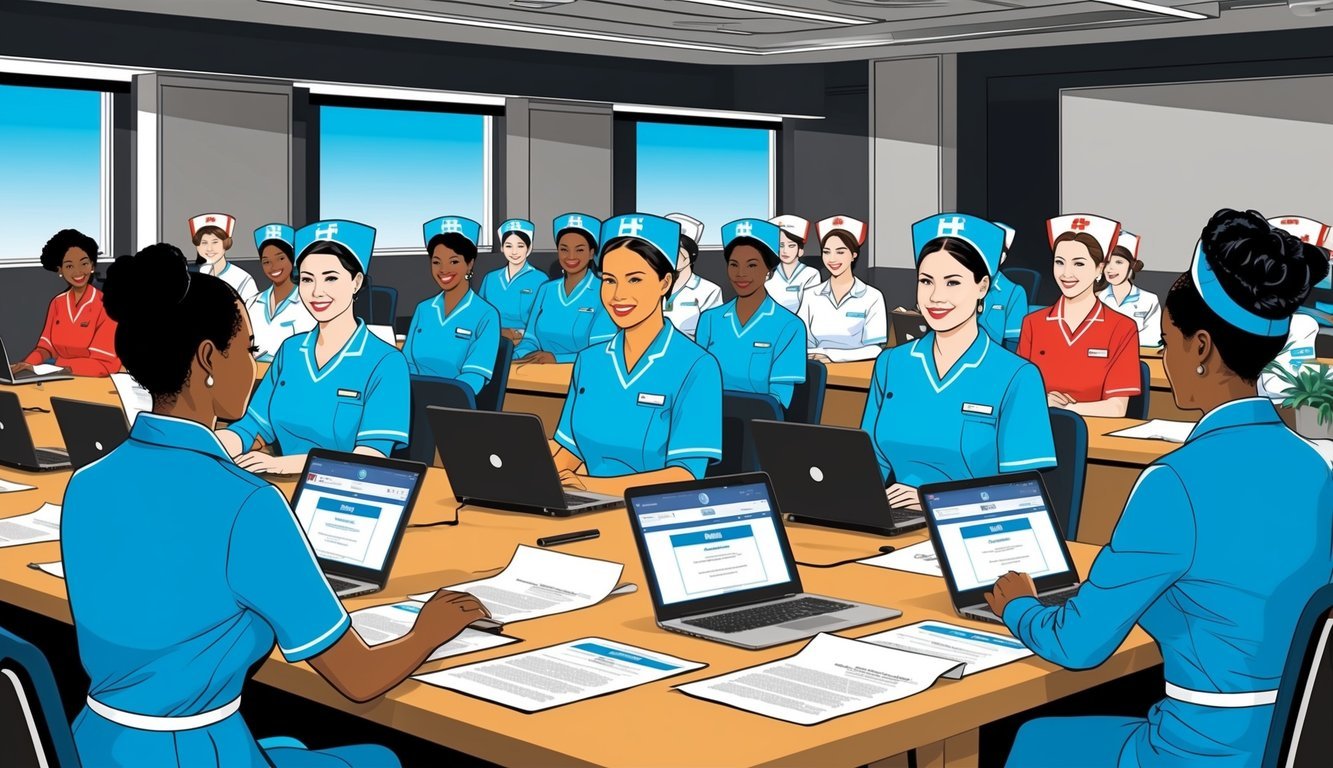If you’re a nurse seeking to transition away from traditional bedside roles, you’re not alone.
Many nursing professionals are exploring diverse career paths that leverage their skills and knowledge without the demands of direct patient care.
Non-bedside nursing jobs offer exciting opportunities across various industries, allowing you to apply your expertise in innovative ways.
Various roles exist within non-bedside nursing, including positions in case management, forensic nursing, and aesthetics.
These jobs not only provide a fresh perspective on your nursing career but also often come with competitive salaries and unique work environments.
By considering these alternatives, you can find a fulfilling path that aligns with your interests and personal goals.
Exploring non-bedside nursing jobs can open doors to specialized fields like health technology, education, or even corporate wellness programs.
As you delve into these options, you’ll discover how your nursing background can serve as a valuable asset in shaping health policies, conducting research, or providing expert consultations.
Diverse Roles in Non-Bedside Nursing
Non-bedside nursing offers a variety of roles that utilize your skills in innovative ways.
These positions allow you to make significant contributions to healthcare without direct patient interaction.
Nursing Informatics and Nurse Informaticist
Nursing informatics combines nursing science with information management.
As an informatics nurse, you’ll work to optimize patient care through technology.
This role involves analyzing data to improve clinical workflows, ensuring that healthcare organizations use data effectively for decision-making.
Key responsibilities include:
- Implementing electronic health records
- Training staff on new technologies
- Evaluating health information systems for usability
With an average annual salary of around $81,093, this role is essential in today’s data-driven healthcare environment.
You may explore further opportunities in this field at NursingProcess.org.
Public Health and Community Health Nursing
Public health nursing focuses on improving community health outcomes.
In this role, you’ll assess community needs, implement health programs, and educate the public on health issues.
Typical duties can include:
- Conducting health screenings
- Organizing vaccination programs
- Collaborating with local organizations for health initiatives
Community health nurses often work for government agencies or non-profits and typically earn an average salary of $75,000 annually.
This role is pivotal for those looking to make a broader impact on population health and can be explored further at Nurse.org.
Nursing Education and Nurse Educator Roles
As a nurse educator, you’ll play a crucial role in training the next generation of nurses.
This involves developing curricula, teaching courses, and mentoring students in practical skills.
Key components of this role include:
- Designing engaging educational programs
- Evaluating student performance
- Staying current with nursing practices
Nurse educators are typically employed in academic settings and can earn an average salary of $80,000 per year.
If you aim to shape future nurses, this role is ideal.
More information can be found at Diversity Nursing.
Legal Nurse Consulting and Forensic Nursing
Legal nurse consultants bridge the gap between nursing and the legal system.
You’ll analyze cases involving medical issues and assist attorneys in understanding medical records.
Essential duties include:
- Reviewing medical documents for accuracy
- Offering expert opinions in legal cases
- Providing deposition and courtroom testimony
Forensic nursing similarly focuses on the intersection of healthcare and the law.
Forensic nurses provide care for victims of crimes while collecting evidence for legal purposes.
Both roles can offer unique careers with specialized knowledge, earning around $81,000 to $102,230 annually.
More insights on this can be found at The Résumé Rx.
Clinical Specialties and Unique Positions
In non-bedside nursing, various specialized roles offer unique experiences and opportunities.
Each of these positions plays a critical role in addressing specific healthcare needs in diverse environments.
Below are some key specialties that may align with your interests and career goals.
Occupational and Environmental Health Nursing
As an occupational health nurse, your focus will be on promoting the health and safety of workers in various industries.
You will conduct health assessments, implement safety programs, and provide education on workplace hazards.
Key responsibilities include:
- Performing health screenings and risk assessments
- Designing and implementing injury prevention programs
- Collaborating with employers to ensure compliance with safety regulations
You will address issues related to environmental exposure and occupational injuries, making your role vital in maintaining a healthy workforce.
For more details on this specialty, you can refer to resources like Nursing Process.
Flight Nursing and Transport Services
Flight nurses play a crucial role in emergency medical transport, providing critical care in air ambulances.
This position requires a strong background in emergency and critical care nursing.
Your responsibilities will include:
- Assessing and managing patient conditions during transport
- Operating medical equipment in high-pressure situations
- Collaborating with flight crews and other healthcare professionals
Flight nursing demands strong decision-making skills and the ability to perform under stress.
Certifications in critical care and advanced life support are often required.
More information can be found at Nurse.org.
Correctional and Cruise Ship Nursing
Correctional nurses provide medical care to incarcerated individuals within prison systems.
Your role involves managing various health issues, from chronic illnesses to mental health concerns.
Key duties include:
- Conducting health assessments and physical exams
- Administering medications and treatments
- Ensuring compliance with legal and ethical standards
On the other hand, cruise ship nurses offer medical care while traveling at sea.
You will handle emergencies and provide routine care for passengers and crew.
Both positions require excellent assessment skills and adaptability in unique environments.
For further insights, consider exploring Nurse Money Talk.
Hospice and Palliative Care Nursing
As a hospice or palliative care nurse, your focus will be on providing compassionate care to patients with terminal illnesses.
You will support patients and their families through difficult times.
Your responsibilities typically involve:
- Managing pain and other distressing symptoms
- Providing emotional support and counseling
- Coordinating with interdisciplinary teams for comprehensive care
This role requires strong communication skills and empathy, as you will often engage with both patients and their families in sensitive situations.
For more on this specialty, check resources like Nursing Process.
Nursing in the Business and Corporate Sector

Nursing roles extend beyond direct patient care into vital areas within the business and corporate sectors.
These positions allow you to leverage your nursing expertise in various professional and administrative settings.
Pharmaceutical and Medical Sales
In pharmaceutical and medical sales, you can use your nursing knowledge to promote and sell medical products and pharmaceuticals.
This role involves understanding the products and how they benefit healthcare providers and patients.
Your background allows you to communicate effectively with clinicians and industry experts.
Key responsibilities include:
- Product Demonstrations: Showcasing the effectiveness of medical products to healthcare professionals.
- Relationship Building: Establishing and maintaining relationships with healthcare providers and facilities.
- Market Analysis: Understanding market trends to position products effectively.
Average salaries in this field can vary, but many positions offer competitive compensation with potential bonuses based on sales performance.
This is an excellent way to combine your nursing background with business acumen.
Healthcare Facilities Administration
As a nurse in healthcare facilities administration, you oversee the operational aspects of hospitals, clinics, or nursing homes.
This role involves ensuring quality patient care while managing budgets, staffing, and compliance with regulations.
Key duties include:
- Staff Management: Hiring, training, and supervising nursing staff and other healthcare professionals.
- Policy Development: Creating and enforcing healthcare policies that promote best practices in patient care.
- Financial Oversight: Managing the budget to ensure the facility operates within financial constraints.
Positions in this area require strong leadership skills and an understanding of healthcare regulations.
Many healthcare administrators have nursing backgrounds, which is crucial for ensuring patient-centered care and operational efficiency.
Nurse Recruiter and Talent Acquisition
In the role of nurse recruiter, you will focus on hiring skilled nursing professionals for healthcare organizations.
Your clinical expertise will guide you in assessing candidates’ qualifications and fit for various nursing roles.
Key aspects of this job include:
- Candidate Sourcing: Actively seeking out qualified nursing candidates through job postings, networking, and recruitment events.
- Interviewing: Conducting interviews to evaluate candidates’ clinical skills and job readiness.
- Coordination with HR: Collaborating with human resources to manage the hiring process efficiently.
This position is vital in addressing the nursing shortage and ensuring that healthcare facilities have the staff needed to provide excellent care.
The national average salary for nurse recruiters is around $71,755 per year, reflecting the importance of this role.
Legal Consulting and Risk Management
Legal consulting and risk management offer a unique opportunity to work alongside legal teams in hospitals or healthcare organizations.
Your nursing background is essential for analyzing cases involving medical malpractice or patient safety.
Key responsibilities include:
- Case Analysis: Reviewing medical records and care processes to identify potential liabilities.
- Policy Improvement: Collaborating with legal teams to develop policies that minimize risk.
- Education and Training: Providing training for staff on compliance and legal issues in healthcare.
This role not only benefits from your clinical knowledge but also requires a strong understanding of healthcare laws.
Legal nurse consultants often earn salaries between $81,093 and $102,230 annually, making this role financially appealing as well.
Innovative Nursing Careers and Telehealth

The healthcare landscape is evolving, and innovative nursing careers are emerging, particularly in the realm of telehealth.
These roles leverage technology to enhance patient care and expand the reach of nursing services.
Below are some key areas where you can apply your skills in non-bedside settings.
Telehealth and Telemedicine Nursing
As a telehealth nurse, you will use technology to provide patient care remotely.
This role often involves conducting virtual consultations, monitoring patient conditions, and offering education on managing chronic illnesses.
Key Responsibilities:
- Conducting assessments via video calls.
- Educating patients about medications and treatment plans.
- Coordinating with healthcare teams to ensure continuity of care.
Telehealth nursing increases accessibility for patients while allowing you to work from various locations.
This career path is especially relevant post-pandemic, as more healthcare providers adopt telemedicine practices.
Health and Wellness Coaching
In the role of a nurse health coach, you will support individuals in achieving their wellness goals.
This involves developing personalized health plans and offering guidance on lifestyle changes, such as nutrition and exercise.
Key Responsibilities:
- Assessing client health needs and setting goals.
- Providing motivational support and accountability.
- Collaborating with other healthcare professionals to optimize care.
This role combines your clinical expertise with coaching skills, leading to meaningful improvements in patient health outcomes.
By using evidence-based strategies, you can empower clients to make informed decisions about their health.
Nurse Writing and Content Creation
If you have a flair for writing, consider becoming a nurse writer.
This role allows you to create educational content for healthcare publications, blogs, and websites.
Your clinical background will enhance your credibility and ensure accurate information.
Key Responsibilities:
- Writing articles and educational materials for patients and healthcare providers.
- Collaborating with medical professionals to produce content.
- Staying updated on industry trends and guidelines.
Nurse writers play a crucial role in disseminating health information.
You can craft messages that resonate with diverse audiences, ultimately improving public understanding of health issues.
Research and Clinical Trials Nursing
In research and clinical trials nursing, you focus on advancing medical knowledge and improving patient care through evidence-based practice.
This involves working with research teams to manage patient care during trials and collecting data.
Key Responsibilities:
- Enrolling and monitoring trial participants.
- Collecting and documenting clinical data.
- Ensuring compliance with regulatory requirements.
This position allows you to contribute directly to medical advancements.
As a nurse researcher, you’ll play a vital role in shaping future healthcare practices and therapies.
Engaging in research not only enhances your professional skill set but also rewards you with the knowledge that you are helping improve patient outcomes.
These innovative nursing careers offer dynamic opportunities outside traditional bedside roles, utilizing your skills to contribute significantly to patient care and the healthcare system.
Professional Development and Certification

In today’s healthcare landscape, professional development and certification are crucial for advancing your nursing career, particularly in non-bedside roles.
Gaining specialized knowledge not only enhances your skills but also opens doors to leadership and advocacy opportunities.
Certification and Advanced Nursing Education
Certification can significantly boost your qualifications.
For non-bedside roles, consider certifications such as Certified Diabetes Educator or Utilization Review certifications.
These credentials signal your expertise to employers and patients alike.
Many organizations offer certification programs that focus on specialized areas, including quality improvement and health informatics.
By pursuing advanced nursing education, you can also earn degrees like a Master’s in Nursing or a Doctorate, which prepare you for administrative or clinical leadership roles.
Nursing Leadership and Administration
For those interested in steering organizational change, roles in nursing leadership and administration are vital.
As a Nurse Administrator, you manage clinical operations, develop policies, and ensure quality patient care across healthcare facilities.
Cultivating leadership skills is essential for effective management.
Programs focusing on healthcare management and administration can prepare you for these responsibilities.
Networking with other leaders and participating in professional organizations enhances your understanding and presence in the field.
Consulting and Health Policy Advocacy
In the role of a consultant or health policy advocate, you shape healthcare practices and legislation.
Nurse lobbyists work to align healthcare policies with patient needs and best practices.
Engaging with policy advocacy requires understanding legislative processes.
Also, you need the ability to engage stakeholders effectively.
Pursuing continuing education in health policy can prepare you for these challenges.
Joining organizations that advocate for nursing issues can also broaden your impact and professional network.
Utilizing certifications and advanced education will enhance your role in consulting or advocacy.
It will also position you as a leader in the nursing profession.

